Popular Resources |Diving Deeper |Science and Scripture | Scientists |Free Online Articles | Audio-visual | For Teachers | For Kids | Theology of Creation |Links Science & Creation sites
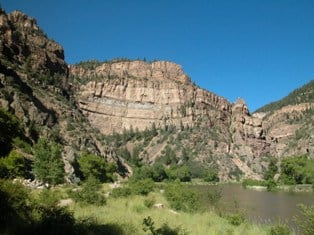 Evolution, interpreted as degrees of change over time, is a fact accepted by all educated Christians, including Seventh-day Adventists, with the qualification that these changes are limited to very low levels of functional complexity (also known as “microevolution”). However, the Darwinian concept that more complex biomachines, to include all living things, evolved from the same common ancestor over hundreds of millions of years by random mutations and natural selection is not science. Such “macro” evolution has never been demonstrated nor is such a story statistically tenable this side of a practical eternity of time. We therefore believe that the Darwinian hypothesis for the origin and diversity of life on this planet should have been abandoned long ago in the face of the continually mounting evidence that is more and more favorable to the biblical hypothesis of origins. For these reasons we believe that the biblical model is the more empirically rational model given the scientific evidence that is currently available.
Evolution, interpreted as degrees of change over time, is a fact accepted by all educated Christians, including Seventh-day Adventists, with the qualification that these changes are limited to very low levels of functional complexity (also known as “microevolution”). However, the Darwinian concept that more complex biomachines, to include all living things, evolved from the same common ancestor over hundreds of millions of years by random mutations and natural selection is not science. Such “macro” evolution has never been demonstrated nor is such a story statistically tenable this side of a practical eternity of time. We therefore believe that the Darwinian hypothesis for the origin and diversity of life on this planet should have been abandoned long ago in the face of the continually mounting evidence that is more and more favorable to the biblical hypothesis of origins. For these reasons we believe that the biblical model is the more empirically rational model given the scientific evidence that is currently available.
Seventh-day Adventist Fundamental Belief 6 affirms the Genesis account of creation in six days. And since the biblical record indicates that life on this planet originated thousands of years ago, rather than billions of years ago, we are linking to a few resources that provide some of the evidence that demonstrates the biblical creation model to be a rational explanation of the origin of life on this planet.
We have gathered together Seventh-day Adventist and other Christian Resources Providing Scientific Evidence for Creation of this Earth Thousands of Years Ago. Let’s remember that we cannot prove this world’s origin either by creation or evolutionary processes. The evidence on this planet can be interpreted to fit either scenario, and both scenarios require faith. But we believe that the evidence fits more consistently into the creation scenario. So we invite you to look at the evidence and make your own decision.
Popular Resources
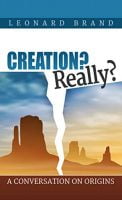 Creation? Really? by Leonard Brand is a great little book to share with someone who is challenged by scientific fact and how it relates to evolution and creation. Maybe you think that creation has to be accepted by blind faith? See how faith and the evidence really relate to each other. The strong emphasis on keeping an open mind is a good example for those of us who “already know the answer.” The book is written as a conversation between two well-educated scientists, which makes it very readable. In the conversation we get a chance to look at the scientific evidence on both sides and and see how both arguments can be affected by assumptions and traditions. Highly recommended, and it won’t take much of your time or money.
Creation? Really? by Leonard Brand is a great little book to share with someone who is challenged by scientific fact and how it relates to evolution and creation. Maybe you think that creation has to be accepted by blind faith? See how faith and the evidence really relate to each other. The strong emphasis on keeping an open mind is a good example for those of us who “already know the answer.” The book is written as a conversation between two well-educated scientists, which makes it very readable. In the conversation we get a chance to look at the scientific evidence on both sides and and see how both arguments can be affected by assumptions and traditions. Highly recommended, and it won’t take much of your time or money. 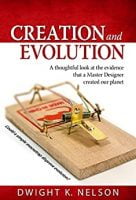
Creation and Evolution by Dwight Nelson asks, “Did a loving God create this earth or are we the random product of millions of years of natural selection? Is the Bible teaching of a literal six-day creation viable, given the scientific evidence pointing toward evolution? Or can both theories be successfully blended into one?”
Take a look at the evidence, prayerfully search your heart, and then draw your own conclusions. The fact is that since no one was there “in the beginning,” both theories of origin require faith—a perfect requirement for the one who wants to know the truth about the beginning . . . and the ending.
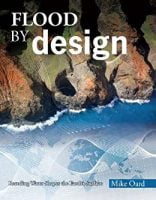 Peter told us that in the end times people would forget the deluge that buried the antediluvian world. And so they have. But there is some compelling evidence for the Flood, and some of that is found in the topography of North America. In Flood By Design, Michael Oard demonstrates what likely happened during the seven months the waters retreated from the earth. I’ve found this book to be a very good read, explaining much of what I’ve seen criss-crossing this continent. It has lots of illustrations and would be suitable for interested students from middle school on up.
Peter told us that in the end times people would forget the deluge that buried the antediluvian world. And so they have. But there is some compelling evidence for the Flood, and some of that is found in the topography of North America. In Flood By Design, Michael Oard demonstrates what likely happened during the seven months the waters retreated from the earth. I’ve found this book to be a very good read, explaining much of what I’ve seen criss-crossing this continent. It has lots of illustrations and would be suitable for interested students from middle school on up.
Earth History Research Center – Multi-lingual site sponsored by Southwestern Adventist University deals with various aspects of origin in simple question-and-answer format. 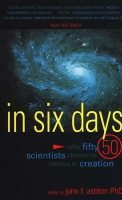 One section contains scientific papers dealing with various aspects of origins.
One section contains scientific papers dealing with various aspects of origins.
In Six Days: Why 50 Scientists Choose to Believe in Creation, by John Ashton is a great read which is also informative. Among other things, you will read that the creation paradigm can actually be the key to new discoveries in applied science.
In this book are the testimonies of fifty men and women holding doctorates in a wide range of scientific fields who have been convicted by the evidence to believe in a literal six-day creation. For example, meet:
* The geneticist who concludes that there must have been 150 billion forerunners of “modern man” in order for the natural selection required by evolution to have taken place in the development of man. The evidence for such vast numbers of “prehistoric man” is in dire shortage.
* The orthodontist who discovered that European museum fossils of ancient man have been tampered with to adhere to evolution theories.
* The geologist who studied under the late Stephen Jay Gould and literally cut the Bible to pieces before totally rejecting evolution.
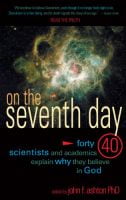 On the Seventh Day, by John Ashton. If you’ve enjoyed reading In Six Days: Why 50 Scientists Choose to Believe in Creation, you’ll be delighted to discover that John Ashton has written a follow-up in this book which presents over 40 PhD’s who explore the linkage between science and faith, and what that means not only to individuals, but to the entire planet, as well. You will meet:
On the Seventh Day, by John Ashton. If you’ve enjoyed reading In Six Days: Why 50 Scientists Choose to Believe in Creation, you’ll be delighted to discover that John Ashton has written a follow-up in this book which presents over 40 PhD’s who explore the linkage between science and faith, and what that means not only to individuals, but to the entire planet, as well. You will meet:
*The skeptic who realized that this solution to a problem was not only wrong, but destructive. Read how a miraculous solution to a vexing problem brought him to faith.
*A psychiatrist who saw her career and personal life transformed by the intersection of faith and knowledge.*
*Scientists who gaze at the heavens, and peer at microscopic creatures to better understand the world in which we live.*
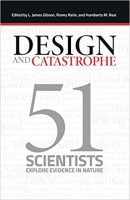 Also see: “John Ashton Interview” by Don Roy and “Can a Christian be a good scientist?” by John F. Ashton
Also see: “John Ashton Interview” by Don Roy and “Can a Christian be a good scientist?” by John F. Ashton
Also see Design and Catastrophe: 51 Scientists Explore Evidence in Nature by L. James Gibson and Ronny Nalin. Read review of this book by Humberto L. Rasi.
If Amazon is sold out, check with the Andrews University Press.
Diving Deeper into Science
 Geosciene Research Institute: This Adventist science site is huge! It is worth investing some time in its exploration.
Geosciene Research Institute: This Adventist science site is huge! It is worth investing some time in its exploration.
I am delighted to see an updated interface, and if you follow all the links on the front page and the links from the following pages, you are likely to find everything on the site. Lots of good stuff on this site, including videos.
Each page seems to have a Search function which allows you to find anything on the site.
The archived version of the Creation and Science secction at the Geoscience Research Institute are mostly scientific papers, with some being more readable than others. The sub-section of “Commentaries on Creation and Science,” which includes quite a number of published articles apparently is not longer available at the GRI site but may be accessed through the Internet Archives. On the current site, there is a section on “Faith and Science” which may or may not include the papers in the archived versions.
If you use Facebook, you can also check out the GRI Facebook page with recent material.
Faith-Science at Southern Adventist University – This collection is extensive. Be sure to follow the links. You may find this page, with its videos, helpful: Faith-Science Origins Curriculum Resources.
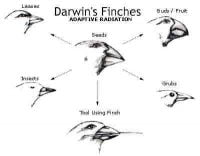 Detecting Design – Naturalism and The Theory of Evolution – On this site, also meant for the scientifically curious, Sean Pitman deals with the statistical problems of the theory of evolution from genetics to geology, which suggests a recent creation as the most reasonable solution to the question of the origin of life on this planet. Lots of material on this site to keep you reading for weeks at least. This site is huge! Unfortunately it takes some patience to find your way around, but it’s filled with many well-reasoned articles. More recent articles are on the WordPress version of Detecting Design.
Detecting Design – Naturalism and The Theory of Evolution – On this site, also meant for the scientifically curious, Sean Pitman deals with the statistical problems of the theory of evolution from genetics to geology, which suggests a recent creation as the most reasonable solution to the question of the origin of life on this planet. Lots of material on this site to keep you reading for weeks at least. This site is huge! Unfortunately it takes some patience to find your way around, but it’s filled with many well-reasoned articles. More recent articles are on the WordPress version of Detecting Design.
Second Look Sabbath Seminars / Faith and Science Sabbath School Class is a Sabbath School class at Loma Linda, CA, focused on the intersection between faith and science. It generally consists of a lecture followed by a question and answer session.
Earth Science Associates: Fingerprints of Creation – Robert V. Gentry sees the polonium halos in granite as evidence for a young earth. “Examining Radiohalos (Review of Creation’s Tiny Mystery)” is a critique of Gentry’s work by members of the Geoscience Research Institute. Members of the GRISDA team present their take on the topic in “The Nature of the Evidence of Supernatural Intelligence, as Illustrated by Polonium Halos.“
In view of the previous entry, the editorial, “Creationists Challenge Creationists,” by Ariel Roth, should be of some interest.
Science and Scripture
Also see our Genesis Resources page.
Science and Scripture – 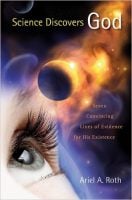 On this site, which is meant for people who want to dig deep, Adventist scientist Ariel Roth attempts to reconcile the authority of science and Scripture. Includes information about books, videos and discussions related to the controversy between the Bible and modern science.
On this site, which is meant for people who want to dig deep, Adventist scientist Ariel Roth attempts to reconcile the authority of science and Scripture. Includes information about books, videos and discussions related to the controversy between the Bible and modern science.
Science Discovers God: Seven Convincing Lines of Evidence, Hard Copy (Published 2009), Kindle Format – In this book Ariel Roth begins with a brief historical sketch that leads into the surprising fact that four out of ten scientists in the United States believe in a personal God who answers their prayers. The paradox is that very few, if any, of these scientists will publish about God in scientific journals and textbooks. What many scientists believe in, and what they publish about when they take a scientific stance can be very different things.
Roth then discusses a number of key issues related to the existence of God. These include the intricate organization of the matter of the universe and the precision of the forces of physics. This is followed by a number of biological topics including the origin of life, the genetic code, and complexities such as the eye and the brain. Consideration is then given to the problem time poses for evolution when the fossil record is analyzed. It turns out that the geologic eons are totally inadequate for the improbabilities postulated.
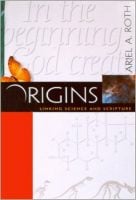 The last third of the book addresses the intriguing question of why is it that, in the context of so much data that seems to require a God in order to explain what we see, scientists still remains silent about Him? (The book is a bit more reader-friendly than the next book below – Origins, which reads a bit like a college text book.)
The last third of the book addresses the intriguing question of why is it that, in the context of so much data that seems to require a God in order to explain what we see, scientists still remains silent about Him? (The book is a bit more reader-friendly than the next book below – Origins, which reads a bit like a college text book.)
Origins: Linking Science and Scripture (Hardcover, published 1998) – Are the realms of science and the Bible irreconcilable? Has science and its theory of evolution disproved the Bible? Is there no meaning to humanity’s existence? In this book Roth argues that there is a lot of scientific evidence that supports the biblical account of beginnings, and that taken together science and the Bible give us a more complete and sensible view of the world around us.
This book attempts to show that the dichotomy between science and Scripture is not what is often surmised and that there is a reasonable harmony between the two. If you feel a bit adrift trying to justify your belief in the biblical account of creation, this is a good book to bolster your understanding and your confidence. Roth is a careful scientist and presents his evidence with lots of end notes for further investigation.
Scientists of Today and the Past who Believed in the Biblical Creation Account
Creation scientists and other specialists of interest
Bible-believing Scientists of the Past
Free Online Articles
[Unless otherwise indicated, the articles below are from the Adventist Dialogue magazine archives.
Genesis: The Missing Piece of the Puzzle – Does the evolution-creation debate really matter? What difference does it make? This article answers those questions and more in an good overview of the competing views of evolutionism and young-earth creationism. From Creation.com. (Not an Adventist site.)
The 10 Best Evidences from Science That Confirm a Young Earth written for the lay person. By Answers in Genesis. (Note: Seventh-day Adventists believe that the life on the earth is young, not that the universe is young.)
Genesis Verse-by-Verse for the lay person by Creation Ministries International.
Genesis and the geologic column Ariel A. Roth
Genesis and the cosmos: A unified picture? Mart de Groot
Can faith and science be divorced? Gary B. Swanson
Science and religion: Pursuing a common goal? Mart de Groot
Science and faith as honest friends H. Thomas Goodwin
Christianity and Science: Are They Compatible? Del Ratzsch
“When Faith and Science clash,” L. James Gibson,
Is the theory of evolution scientific? Leonard Brand
Science Finds God, by Ariel Roth (Adventist Dialogue magazine.)
Evidences of a Recent Creation1, by Harold G. Coffin (PDF file on Adventist Biblical Research.)
Catastrophism? Yes! by Ariel Roth. (Adventist Dialogue magazine.)
Coal: How Did It Originate? Harold G. Coffin
The Puzzle of the Petrified Trees Harold G. Coffin
Fossils: The story they tell us Carlos F. Steger
Evolution and diversity of life David L. Cowles and L. James Gibson
Chance or design? The long search for an evolutionary mechanism, by Ariel Roth.
Intelligent design and its critics John C. Walton
Is there design in nature? L. James Gibson
Design in nature: Millennia of arguments Timothy G. Standish
A creationist’s view of the solar system George T. Javor
The search for Adam’s ancestors Elaine Kennedy
The search for Noah’s ark David Merling
Can Science Explain It All? Benjamin L. Clausen
“Science or Scientism,” by Leonard Brand.
Why do different scientists interpret reality differently? Humberto M. Rasi
Audio-visual Resources
Our Page of More Selected Science Video Resources
Is Genesis History? Fascinating documentary film based on the Mt. St. Helens incident. Link provides overview plus extra resources below video. The full documentary is also available for free on Youtube.
And if you don’t have time to view the full video at once, you can see it in small snippets on the Is Genesis History? Youtube channel. It helps to be aware that Seventh-day Adventists don’t believe that God created the whole universe on the first day of the Genesis account – only this planet or solar system. In fact, the actual matter of this planet may have been created in its “without form and void” form long before. We just don’t know. But the Genesis account does say that the Lord, through His Word, prepared the planet for life and then created living creatures, including man to in habit it.
If you want to dig deeper after viewing the video above, you may consult the producer’s recommended reading list, which he introduces thus:
When I produce a documentary, I like to do all the research myself.
The problem I faced with Genesis, however, is that I wasn’t researching just one subject; I was researching thirty. They included complex topics such as stratigraphy, baraminology, hermeneutics, genetics, and cosmology (to name a few). There’s a good reason experts have PhD’s in a single area: when you dive into these subjects, it’s like falling down a rabbit hole.
So here is his list of books you may use for further research: “Falling Down a Rabbit Hole: Ten Books to Understand Genesis.”
A well-done video demonstrating current creation science view on what happened during the Flood. Though not produced by Adventists, it mirrors our understanding closely:
Creation Talks at Audioverse.org (audio only)
Science and Scripture – a series of 16 half-our interviews of Adventist scientist Ariel Roth by Norman H. Peckham on LLBN (linked to Youtube).
The David Rives Ministries : Uncovering God’s Fingerprints of Design Throughout the Universe. Youtube channel has lots of interesting videos. Most playlists are on creation science. Excellent material, not Adventist.
Biblical Science Institute Channel on Youtube and Biblical Science Institute on Rumble (Youtube sometimes deletes videos.)Not an Adventist site.
Youtube Playlist: Understanding Creation: Presentations (many by the authors themselves) of chapters from the book Understanding Creation, edited by Humberto Rasi and James Gibson and published by Pacific Press Publishing Association (2011). From Paul Giem’s Sabbath School class. 18 videos.
David Asscherick on “Five Good Reasons To Doubt Darwin”:
Youtube Playlist: the Beginning: Science and Scripture Confirm Creation. Paul Giem invites experts to his Sabbath School class to discuss issues surrounding science and Scripture. 17 videos.
![]() Icons Of Evolution (available on Amazon) the classic video that asks some serious scientific questions about the legitimacy of Darwinism as an explanation of origins. If you haven’t seen it yet, you owe it to yourself to watch it. (This movie argues for the legitimacy of creation science, but not a recent 6-day creation week.) Note that the book, Icons of Evolution: Science or Myth? Why Much of What We Teach About Evolution Is Wrong provides much more detail on the subject.
Icons Of Evolution (available on Amazon) the classic video that asks some serious scientific questions about the legitimacy of Darwinism as an explanation of origins. If you haven’t seen it yet, you owe it to yourself to watch it. (This movie argues for the legitimacy of creation science, but not a recent 6-day creation week.) Note that the book, Icons of Evolution: Science or Myth? Why Much of What We Teach About Evolution Is Wrong provides much more detail on the subject.
Materials for Teachers and Others Interested in the Science of Origins
HomeSchool Resources at Institute for Creation Research.
Genesis Apologetics: Debunking Evolution Program for 5th-10th Graders includes videos and free Student Guides.
Collected Papers on Faith and Science from the Geoscience Research Institute. These articles are relevant all the way up to and including university classrooms, and should be of interest to the informed lay reader.
Archive of Origins, a Peer-reviewed Journal include book reviews, current developments in science and creation.
GRISDA Website for High School and College Teachers
PowerPoint Teaching Resources at Geoscience Research Institute for use in middle and high schools, and in General Biology, Genetics, and Molecular Genetics classes.
Creation Resources for Kids
Creation for Kids Articles
Articles on Theology of Creation
Creation and the Bible articles at the Geoscience Research Institute are mainly word and textual studies in Genesis, but include three papers on Creation in the New Testament.
The Found World of Genesis I: Is Theistic Evolution a Meaningful Option for Seventh-day Adventists? by Nicholas Miller
The “Found” World of Genesis 1 Part II: How Does Science Inform Theology, by Nicholas Miller
The Lost and Found World of Genesis 1, by Roy E Gane
Creation in the New Testament, by Ekkehardt Mueller (PDF file)
Links to Other Sites Relevant to Science and Creation
Please note that these are not Seventh-day Adventist sites and provide an overview of various viewpoints, including opposing evolutionary viewpoints.
GlobalFlood.org online home of Dr. John Baumgardner’s work related to the Genesis flood, in which he demonstrates how his hypothesis matches observable data.
Discovery Institute – Leaders in the Intelligent Design movement. Most of these do not promote a “young earth” in line with the biblical record, but they provide some of the best anti-evolution arguments from a scientific perspective. They also produced Icons Of Evolution, a video that asks some serious questions about Darwinism.
In the Beginning: Compelling Evidence for Creation and the Flood by Dr. Walt Brown, a mechanical engineer. This online book (also available in hardback or softcover format on Amazon) proposes a scientific model for the mechanics of the world-wide flood and how it may account for the geology we see today. (The hard copy is much more user-friendly than the web page.)
Tas Walker’s Biblical Geology. An engineer who went back to university to study geology, Tas Walker presents a geological history model based on the biblical record of a world-wide flood.
Institute for Creation Research. Includes popular as well as peer-reviewed research section.
Creation Ministries International articles related to science and creation from a young-earth perspective. Publishes Creation Magazine – unique quarterly 56-page full-color family magazine focuses on God’s creation, suitable for K-12 students. Also publishes Journal of Creation, an in-depth, peer-reviewed comment, reviews and the latest research findings that relate to origins and the biblical account of Creation, the Flood and the Fall. 3 issues per year
Creation Wiki -free encyclopedia from a creationist perspective.
Creation Research Society – Professional organization of trained scientists and interested lay persons committed to scientific special creation. Publishes a popular bi-monthly magazine called Creation Matters, with online archives, as well as a peer-reviews journal, the CRS Quarterly, with selected articles available online.
True Origins archive, a creationist response to the anti-creationist www.talkorigins.org
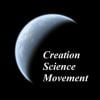 Creation Science Movement British site described as the the oldest creationist movement in the world. Includes book reviews and archive of online journals.
Creation Science Movement British site described as the the oldest creationist movement in the world. Includes book reviews and archive of online journals.
Origin of the Species by Charles Darwin with a 50-page introduction by creationist Ray Comfort. (PDF file)
Answers in Genesis – Very readable, popular creation science site that promotes the idea that not only this earth but also the whole universe is only thousands of years old. (Seventh-day Adventists generally believe that the universe is much older than this planet.) Includes much good material, but has sometimes tended to accept spurious evidence in favor of a young earth.

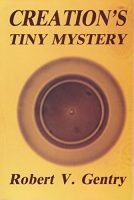

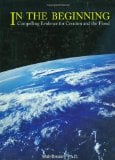
“Evolution, interpreted as degrees of change over time, is a fact accepted by all educated Christians, including Seventh-day Adventists, with the qualification that these changes are limited to very low levels of functional complexity (also known as “microevolution”).”
Does this mean we should believe the evolution theory? !!!?
Hello. I’m a Sabbath School teacher and former atheist. Please allow me to help you to understand this issue.
Micro evolution is many species descending from two parents. Two of every “kind” were on Noah’s Ark, not two of every species. For example, two dogs with a complete set of genetic information (maybe wolves) from which all of today’s dogs descended. This involves an information loss, not a gain. For instance, both the chihuahua and the Great Dane descended from two original dogs, but the chihuaha would not have the height genes of the Great Dane.
This is different to macro evolution, also known as molecules to man evolution. That process would need masses of new genetic information to turn a single celled creature into every living thing on earth. There is no known process by which living things get masses of healthy new genetic instructions. Mutations turned out to be damaged genes that cause deformities (hence movies like Total Recall), and such creatures can’t compete against their non-mutated relatives, so they die out.
Cutting edge science supports micro evolution, which is completely Biblical. It does not support macro evolution, and neither does scripture. The Seventh-day Adventist church rightly believes in micro evolution, but rejects macro (molecules to man) evolution.
God created the earth in 7 days making our week as we use now. How could anyone believe that earth somehow blasted earth’s non-living matter with a power that does not exist to form all life that we see today? It’s impossible! What I want to know is how and what the scientist of evolution used to measure the evidence with that lead them to believe that the earth is millions of years old. Can someone answer that please and email me?
Loretta, the Bible says that in the beginning GOD created the heavens and the earth and that the earth was without form and void. We don’t really know for how long the earth remained without form and void. (I assume without life on it is what is meant without form and void). Still no one knows for how long that was.
I would say that science unsupported by Scripture is something we should look at with skepticism. Such is not just speculative, it is also completely non-essential to salvation. We therefore should not be concerned about such theories and suppositions.
Amen, Loretta, I believe that verses 1 and 2 of Chapter 1 in Genesis is very clear that there is a phase to God’s creation that is not limited by “Evening and morning” of any 24 hour period but just that God made “Heaven and earth” or in other words “The Universe that also includes the earth” and that the earth was without form and void etc.
Please remember that the point of these resources is to demonstrate that God does not expect us to believe “just so” stories, but that even the evidence of nature coincides with the record of Scripture, if we are willing to see it.
Otherwise, a belief in creation would be akin to belief in the “spaghetti monster,” as Sean Pitman likes to point out. How would you choose between different belief systems, if there were no rational evidence at all? Those who believe in naturalistic science point to rational evidence, and if all a Christian has to offer in return is belief in an ancient book written by who knows who, what kind of evidence is that?
The comment section here is reserved for comments on the Resources. It is not intended to be a place to discuss evolution vs creation. Please consult the resources to become knowledgeable on the subject.
It is amazing how some scientists doubt creation and the existence of God. Generally speaking these people should have had more faith in God because they have gone deeper to study most complex things that God created like the human body, the earth, the universe etc. Just the way these things are made and the way they function in coordination should have made these people to realise that there is a designer behind all these.
Can a normal person find a BMW X5 in the jungle and conclude it made itself and parked itself there? All technological equipments we see today are as a result of great Scientist. Honestly, how can any of these equipments if they were to speak say they came into existence on their own? Can an airplane make itself? If these great scientists exist with all the intelligence surely there must be someone who created these who is far beyond intelligent than them. After making great wealth by studying the maker’s creation, they still rejected the maker. Anyway this is gross ignorance beyond measure and I think Psalms 53:1 describes them best. May God’s grace fall on all those still alive to know Christ before they join their ancestors.
———Link to book added by Moderator. Check out the customer reviews on Amazon.
Just a comment on “Is Genesis History?”
I found the interview with Steven Boyd interesting. At 19:06, Dr. Boyd states that there is no Hebrew word for “universe.” The lexicon for biblical Hebrew contains about 6000 words. In contrast, the English lexicon contains about 600,000 words. For this reason, a Hebrew word could have many (sometimes quite) different meanings, which would have to be determined from context. This ambiguity separated from its context can be pretext for proof-text, that is, representing scripture as supporting preconceptions when it does not.
Further, the culture and history of a people is reflected in their language, which is intimately associated with these elements. At 19:14, Dr. Boyd states that in Genesis 1:2, “we find a water ball in space.” In this, I believe he is reading a 19th century cosmology into the Hebrew text that is not there. The text says:
On the second day, God said:
And on the third day:
This description of the earth as land within an air “bubble” (expanse) inside a primeval ocean that is above and below it, is foreign to our 21st century understanding of the cosmos, but aligns with the ancient cosmology of the near east.
Google “ancient near eastern cosmology” and “ancient hebrew conception of the universe” to see the obvious similarities to the Genesis creation account. Expressions such as the “windows of the heavens,” “fountains of the great deep” and how the “Spirit of God was moving over the face of the waters” make a lot of sense in the context of this cosmology. At the 1:28:09 mark of the film, Douglas Petrovich introduces the audience to the Summarians and the Babylonians and the spread of their culture and influence over the Near East and even into Egypt. This influence is seen in ancient Hebrew cosmology.
It is also interesting that Dr. Boyd states that Genesis 1 is narrative and not poetry (19:32). Hebrew poetry rhymes thoughts not words:
This is not the epic poetry of the Chaldeans, as Dr. Boyd points out, but it is the Hebrew poetry of rhyming thought.
God communicates his eternal truths using the cosmology and culture with which those he calls are familiar. The strength of many of the arguments presented in this video are dependent on the viewers taking them at face value because of the credentials of the presenters. The problem with this approach is that when a person discovers the evidence has been overstated, misstated or misrepresented, they will question the veracity of Christianity. Unbelieving seekers who have a deeper understanding of matters presented in the video will struggle with the “truths” as presented and their inevitable confounding with the Truth of Christ. These are reefs on which to shipwreck faith in the finished work of our Lord and Saviour.
Thank you for your comment, Richard.
A couple of observations on your comment:
You propose that Genesis contains a “description of the earth as land within an air “bubble” (expanse) inside a primeval ocean that is above and below it,” but I don’t see it quite that way. I see “the waters above” as a more water-dense atmospheric envelope around this planet which would produce a more uniform climate throughout. It would essentially produce a greenhouse effect. Nothing in the text says which view is correct. So we must choose what best fits both the rest of Scripture and science (much of which has not been discovered, thus must reason about probably effect).
You suggest
Some see this similarity as demonstration that the Genesis account is a reflection of these other accounts. I see it as Genesis being the original God-inspired account, and the others being reflections of it with various degrees of contamination by sin-affected human imagination. (The same is true regarding the biblical sacrifical system and heathen sacrifices.)
I haven’t time to go back to watch the video right now, but there’s a contradiction in your comment which you may wish to clarify:”Dr. Boyd states that Genesis 1 is narrative and not poetry….This is not the epic poetry of the Chaldeans, as Dr. Boyd points out, but it is the Hebrew poetry of rhyming thought.”
The video is necessarily limited. Not all questions can be answered, and I personally do not agree with every point made. For a very careful but brief scientific evaluation of the old-earth scenario of modern naturalistic science compared with the young-earth scenario of biblical creationism, please see the book I am currently reading. Choose You This Day: Why It Matters What You Believe About Creation, by Leonard R. Brand & Richard M. Davidson. That’s a team of two very careful scholars – Brand, a biologist and paleontologist and Davidson, an Old Testament scholar at Andrews University. The book is a very brief and inexpensive, but it covers the issues well and provided voluminous footnotes for further study.
For more depth, you might start with Brand’s own book, Faith, Reason, & Earth History: A Paradigm of Earth and Biological Origins by Intelligent Design. (It’s much longer, and I haven’t finished reading it.)
Inge, I appreciate your comments. Let me clarify my comment by first noting that Abram, the Father of Faith, was called out of Ur of the Chaldees, that is, he was called out of Babylon. Abram, as part of that civilization, would be very familiar with its culture, religion and cosmology. Further, when God appeared to him in Genesis 15, God used a contract ritual that has its roots in ancient Near Eastern culture and sympathetic magic. The ceremony included a smoking brazier and a flaming torch, which are elements of an Akkadian incantation to thwart the power of witches. The Babylonian empire evolved from the Summarian and Akkadian empires. There is an obvious influence of these cultures in Genesis.
In the video, Dr. Petrovich demonstrated the archeological evidence for the spread of this culture throughout the Near East. So it is no surprise that in Genesis 1, the cosmology of the ancient near east is clearly evident. But God acts radically in the context of that cosmological framework to reinterpret it to creatively reveal his character and intentions toward mankind. Imposing a modern cosmological framework on the Genesis account, as Dr. Boyd has done, would distort the character and intentions of God, and damage faith in God’s work and his word. This is my first concern.
My second concern was Dr. Boyd’s assertion that the Hebrew form of Genesis 1 is historical narrative, that is, historical scientific fact. As I pointed out in my comment, Genesis 1 is clearly poetic in form and is not narrative. I note that immediately after Adam and Eve were created, God entered his rest—the strong implication being that the parents of mankind entered with him. The poetic truth of Genesis 1 and 2 is relational—God acts creatively to bring order out of cosmic chaos for the purpose of establishing a place and time for a relationship of love with mankind that mirrors the love seen within the godhead.
Dr. Boyd compares Genesis to the Babylonian creation story, and concludes that Genesis is narrative because it does not take the form of the epic creation poetry of the Chaldeans. However, as I pointed out, the form of Genesis 1 is that of Hebrew poetry, that is, rhyming thought. The creation account in Genesis uses the understood cosmological framework of the Hebrew fathers to poetically present the genesis of God’s loving relationship with mankind.
In summary, confounding ancient cosmology with current cosmology and imposing a narrative form and elements of current cosmology on a poetic expression of relational truth distorts the works and words of God and sets up those who follow and seek God for disillusionment and consequential loss of faith.
I appreciate the opportunity SSNet provides to explore faith-related thoughts and ideas.
Thanks, Richard. I now understand some of your comment better. I really appreciate your giving the exact place in the video on which you are commenting.
Have you watched the whole video or only the first half hour or so? (The presentation is not perfect, but it includes a lot of good material in a general overview.)
First of all, in regard to Dr. Boyd’s observations regarding “universe,” I consider the terminology of world vs universe irrelevant and, along with most Adventist scholars and scientists, disagree with what appears to be his view – that the Genesis account describes the creation of the universe, as I mentioned in the introduction of the video (text above it).
I believe Dr Boyd is correct in that Genesis is not written in poetry form – both from my own understanding as a student of biblical poetry (as one part of my literary education) and from the testimony Hebrew experts. His reference to epic poetry is irrelevant and had better been left out. My own judgment is that Genesis does no use the parallelism that is the prominent feature of Hebrew poetry and is therefore not intended to be figurative poetry. (I am well enough acquainted with Hebrew parallelism that I groan inwardly when some Adventist pastor preaches an “exegetical” sermon making a point out of the two parts of a synonymous parallelism as though they were not parallel.)
Dr Boyd mentions that the best Hebrew scholars recognize Genesis as a factual prose account. It seems that was still true in 2020.
“Dealing with the Genre of Genesis and its Opening Chapters” refers to Genesis 1 as prose a number of times and includes this elucidation:
“Major Error in Hermeneutic of Many Old-Earth Creationists” is a good overview of Hebrew poetic parallelism and corroborates my personal judgment of Genesis as lacking the characteristics of Hebrew poetry. There is much more that could be cited, but even if scholars agreed that Genesis 1 is poetry, that would not nullify its historical value, considering that oral cultures transmitted much of their history in poetic format, since it is easier to memorize and transmit. Indeed, Genesis does display an earmark of poetry in its economy of words. So one might consider it a kind of poetic prose.
But before we go further in critiquing the video, I am interested to know how you believe life on this planet came about, since you do not seem to accept Genesis as being a historically accurate narrative. Please share your understanding.
Hello Inge,
The end of the third paragraph in my previous comment sums up my current thoughts on how and why mankind came to exist on this planet:
In the story of his creation, God radically reinterprets the existing ancient Near East understanding of cosmology and the origin of life and mankind as a manifestation of his character, that is, love. The instructions he gave to the first man and woman coincide with that relational fundamental. God’s love is the fundamental for the existence of the cosmos.
Moreover, the Genesis creation story is expressed in terms of the cosmology of the ancient Near East. How would imposing other “historically accurate narrative” cosmological constructs on that story impact its meaning? “Any (biblical) text, without a (its historical, grammatical, canonical, and literary) context, is a pretext (an opportunity falsely taken) for a proof-text (a text abused by a preacher or Bible study leader to make a point that is not actually being made by the text itself).” (https://heidelblog.net/2010/11/any-text-without-a-context-is-pretext-for-a-prooftext/, accessed 2022.04.08.) I believe this imposition could misrepresent God’s truth and impede faith in the works and words of God.
What would an “historically accurate narrative” mean to Hebrew slaves just freed from Egypt? What purpose would an “historically accurate narrative” have in their redemption? Would their “concern” about the Genesis narrative be the same as those who produced “Is Genesis History?” I do not think so. Their context would have no relation to the pretext of the “Is Genesis History?” proof text construct.
I appreciate and value the opportunity for dialogue.
Richard
I appreciate the intellectual rigor that Biblical science brings to faith discussions.